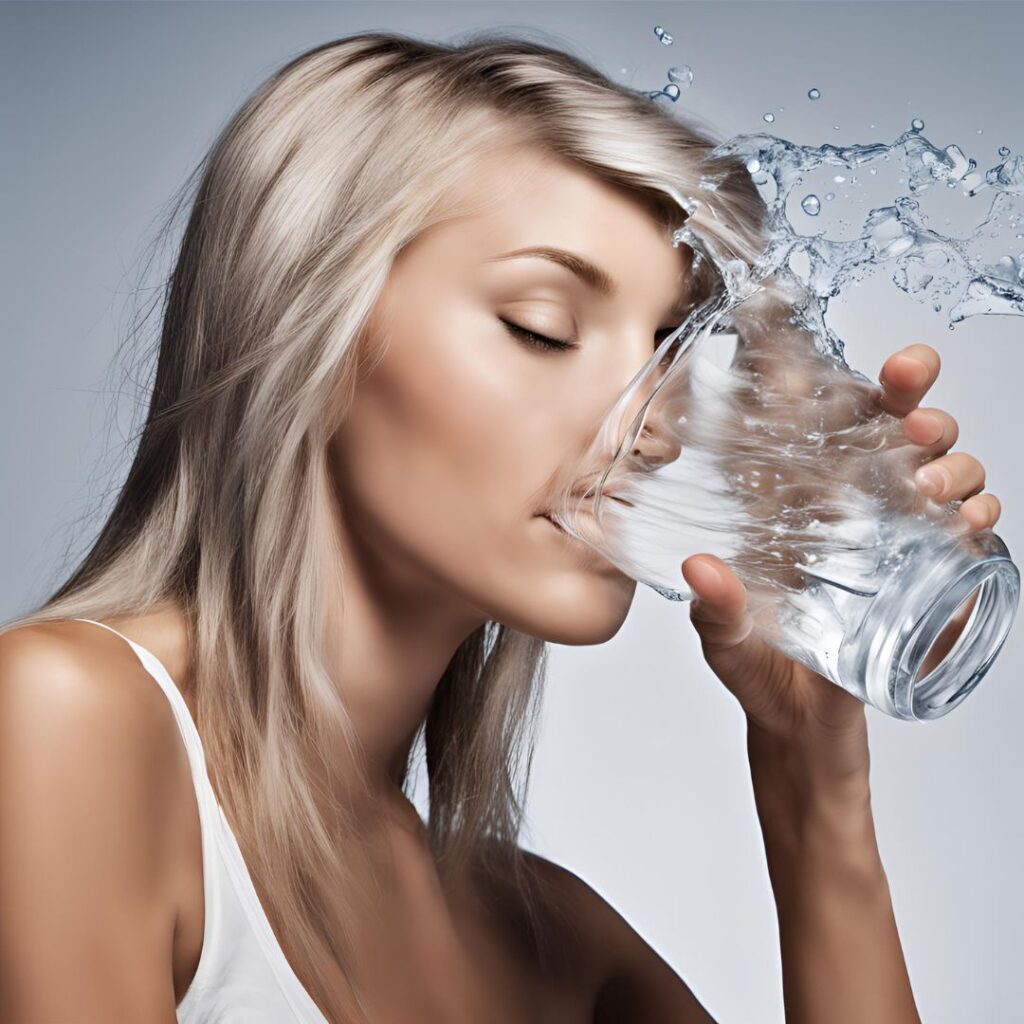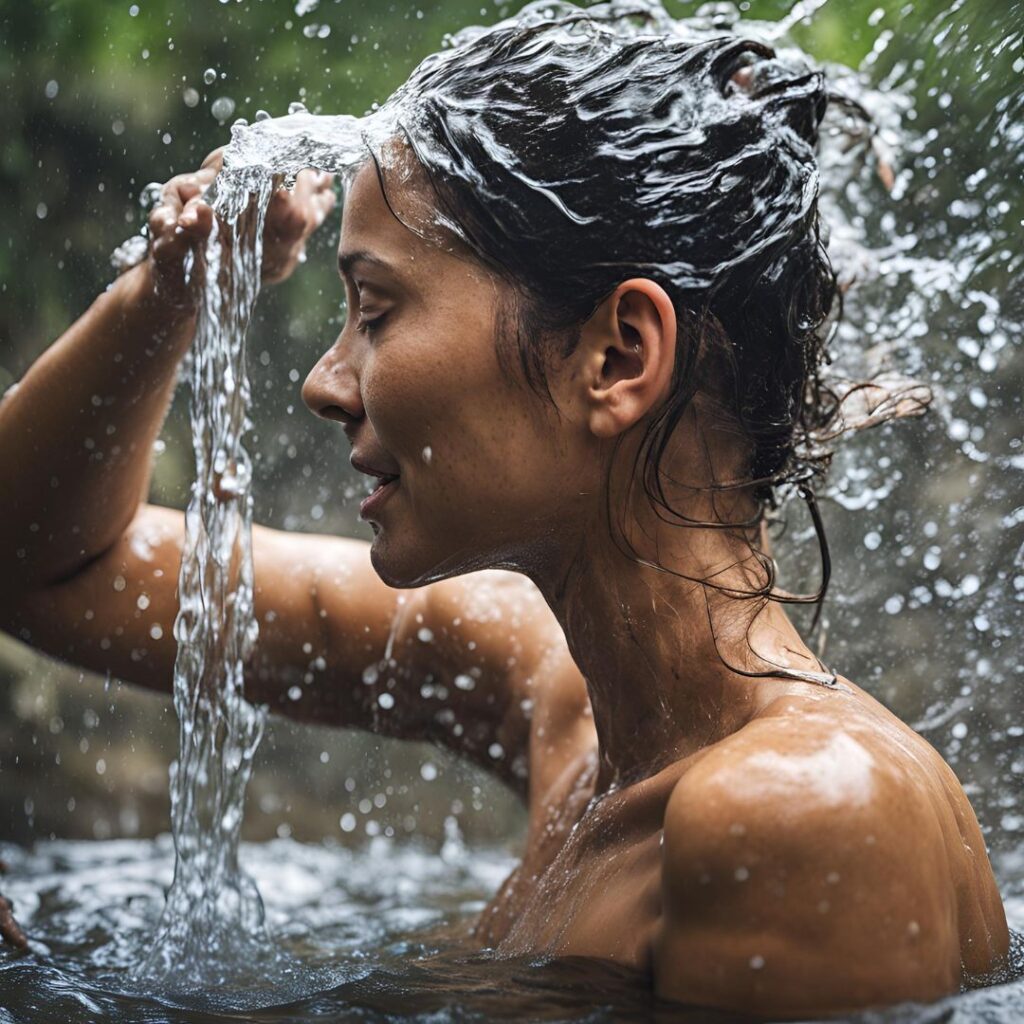Problem: The Struggle for Healthy Hair
Ever looked in the mirror and felt Unhappy about your hair? Maybe it’s thinning, breaking, or just not growing as fast as you like. You’re not alone. Many people struggle with hair issues, and it’s a common problem that can affect your confidence and overall health. We spend countless dollars on shampoos, conditioners, and treatments, hoping for a miracle cure. But what if the solution was simpler than we thought? What if it was something as basic and accessible as water?
Agitation: The Endless Search for Solutions
We’ve all been there trying every new product that promises beautiful<healthier hair, only to be dishearten. The hair care industry is massive, filled with products that claim to solve all our hair problems. But despite the plenty of options, many of us are still left searching for that one magic solution. The headache of spending money on products that don’t work but can increase the problem even more. And let’s not forget the time and effort we invest in these routines.
But here’s the kicker: while we focus on external treatments, we often overlook the most basic feature of hair health hydration. Yes, water. The simple act of drinking enough water and keeping your scalp hydrated can have a deep impact on your hair growth and overall hair health.

Solution: The Power of Water for Hair Growth
So, can water really help with hair growth? The answer is a CLEAR yes. Let’s dive into the science and explore how staying hydrated can be the key to unlocking healthier, stronger hair.
The Science behind Water and Hair Growth
Hydration and Hair Follicles
Your hair follicles are the tiny structures in your scalp where hair growth begins. Each follicle is like a mini factory, producing hair strands. For these factories to work efficiently, they need a steady supply of nutrients and hydration. Water plays a crucial role in this process.
When you’re dehydrated, your body focus on vital organs like the heart and brain, often neglecting less critical areas like your hair follicles. This can lead to dry, brittle hair that’s vulnerable to breakage. On the other hand, when you’re well-hydrated, your hair follicles receive the necessary moisture to function perfectly, promoting healthy hair growth.
The Role of Scalp Health
A healthy scalp is the foundation for healthy hair. Just like the soil needs to be fertile for plants to grow, your scalp needs to be in good condition for your hair to flourish. Water helps maintain the natural moisture balance of your scalp, preventing dryness and dandruff. A hydrated scalp is less likely to suffer from issues like dandruff, which can impact hair growth.
Nutrient Absorption
Water is essential for the absorption of nutrients in your body. Vitamins and minerals like biotin, vitamin C, and iron are crucial for hair growth. Without necessary water intake, your body can’t effectively absorb these nutrients, no matter how healthy your diet is. Drinking enough water ensures that your body can make the most of the nutrients you consume, supporting overall hair health.
Case Study: Real-Life Results
Let’s take a look at a real-life case study to understand the impact of water on hair growth. Meet Zara, a 28-year-old woman who struggled with slow hair growth and frequent breakage. Despite trying various hair care products, she saw little improvement. Frustrated, she decided to focus on her hydration levels.
Zara started drinking at least 8 glasses of water a day and made sure to stay hydrated throughout the day. Within three months, she noticed significant changes. Her hair was growing faster, felt stronger, and had a healthier shine. Emily’s experience highlights the often-overlooked importance of hydration in achieving healthy hair.

How Much Water Should You Drink?
So, how much water do you need to drink to see these benefits? The general recommendation is to drink at least 8 glasses (64 ounces) of water a day. However, individual needs can vary based on factors like age, weight, activity level, and climate. A good rule of thumb is to drink enough water so that your urine is light yellow or clear, indicating proper hydration.
Tips for Staying Hydrated
- Carry a Water Bottle: Keep a reusable water bottle with you at all times. This makes it easy to sip water throughout the day.
- Set Reminders: Use your phone or a hydration app to set reminders to drink water regularly.
- Infuse Your Water: If plain water feels boring, add a splash of flavor with natural infusions like lemon, cucumber, or mint.
- Eat Water-Rich Foods: Add some fruits and vegetables with high water content into your diet. Watermelon, cucumber, and oranges are great options.
- Monitor Your Intake: Keep track of how much water you drink each day to ensure you’re meeting your hydration goals.
The Connection between Hydration and Hair Care Products
While drinking water is essential, it’s also important to consider the hydration of your scalp and hair externally. Using hair care products that support moisture retention can addition to your internal hydration efforts. Here’s how you can integrate water-friendly products into your hair care routine:
Choosing the Right Shampoo and Conditioner
For shampoos and conditioners that are hydrating and free from harsh chemicals like sulfates and parabens. Look for ingredients like aloe Vera, glycerin, and hyaluronic acid, which help retain moisture in your hair and scalp.
Hydrating Hair Masks and Treatments
Include hydrating hair masks and treatments into your routine. These products often contain deep-conditioning ingredients that penetrate the hair shaft, providing intense moisture. Use a hydrating mask once a week to keep your hair soft and manageable.
Leave-In Conditioners and Serums
Leave-in conditioners and serums can provide an extra layer of hydration and protection. They help lock in moisture and prevent your hair from drying out throughout the day. Apply these products to moist hair after washing for the best results.
The Role of Diet in Hair Hydration
While drinking water is crucial, your diet also plays a significant role in maintaining hydration levels. Consuming foods that are rich in water content and essential nutrients can support your hair health from the inside out.
Do you know that if you drink juice that will icrease the growth of your hair

Water-Rich Foods
Foods with high water content into your meals. Some excellent options include:
- Cucumbers: Composed of about 95% water, cucumbers are a refreshing and hydrating snack.
- Watermelon: This juicy fruit is not only delicious but also contains about 92% water.
- Strawberries: With a water content of around 91%, strawberries are a sweet way to stay hydrated.
- Lettuce: Leafy greens like lettuce are packed with water, making them a great addition to salads.
Nutrient-Dense Foods
Ensure your diet includes foods rich in vitamins and minerals that support hair health. Some key nutrients for hair growth include:
- Biotin: Found in eggs, nuts, and seeds, biotin is essential for hair growth and strength.
- Vitamin C: Citrus fruits, bell peppers, and broccoli are excellent sources of vitamin C, which helps in collagen (protein) production and hair growth.
- Iron: Spinach, lentils, and red meat are rich in iron, a vital nutrient for preventing hair loss.
Common Myths about Water and Hair Growth
When it comes to hair growth, there are plenty of myths and misconceptions. Let’s talk about some of the most common ones:
Myth 1: Drinking Excessive Water Will Make Your Hair Grow Faster
While staying hydrated is essential for hair health, drinking excessive amounts of water won’t necessarily speed up hair growth. Your body can only absorb a certain amount of water, and any excess will be urinated. Focus on maintaining a balanced hydration level rather than overloading on water.
Myth 2: Only External Hydration Matters
External hydration through hair care products is important, but it’s not the only factor. Internal hydration plays a crucial role in maintaining overall hair health. A combination of both internal and external hydration is the key to achieving the best results.
Myth 3: Water Alone Can Solve All Hair Problems
While water is a fundamental component of hair health, it’s not a cure-all. Other factors like diet, genetics, and overall health also play significant roles. A holistic approach that includes proper hydration, a balanced diet, and suitable hair care practices is essential for optimal hair growth.
Practical Steps to Incorporate Hydration into Your Hair Care Routine
To make the most of the benefits of water for hair growth, follow these practical steps:
- Start Your Day with Water: Begin your day by drinking a glass of water. This helps kick start your hydration and sets a positive tone for the rest of the day.
- Hydrate Before and After Exercise: Physical activity can lead to dehydration, so make sure to drink water before, during, and after your workouts.
- Use a Humidifier: If you live in a dry climate, using a humidifier can add moisture to the air, benefiting both your skin and hair.
- Avoid Hot Water: Washing your hair with hot water can strip it of natural oils, leading to dryness. Use cool water instead.
- Protect Your Hair from the Sun: Excessive sun exposure can dehydrate your hair. Wear a hat or use hair products with UV protection when spending time outdoors.

Conclusion: Embrace the Power of Water for Healthy Hair
In conclusion, water is a fundamental yet often overlooked component of hair health. By staying hydrated, you can support your hair follicles, maintain a healthy scalp, and ensure the proper absorption of essential nutrients. While water alone may not solve all your hair problems, it is a crucial element in a broad approach to hair care.
So, the next time you find yourself frustrated with your hair, take a step back and consider your hydration habits. A well-hydrated body can lead to healthier, shinier, and stronger hair. Cheers to drinking up and embracing the power of water!
Frequently Asked Questions (FAQ) About Water and Hair Growth
Q1: How much water should I drink daily for optimal hair health?
A1: While the general recommendation is to drink about 8 glasses (64 ounces) of water a day, an individual needs can vary based on factors like age, activity level, and climate. It’s essential to listen to your body and drink when you’re thirsty. Staying consistently hydrated will support not only your hair health but your overall well-being.
Q2: Can drinking water alone improve my hair texture?
A2: Drinking water is crucial for overall hair health, but it works best in together with a balanced diet and proper hair care routine. While hydration can help maintain your hair’s elasticity and prevent dryness, incorporating nutrient-rich foods and using hydrating hair products will give you the best results.
Q3: Are there specific times of the day when I should drink water for hair growth?
A3: There isn’t a specific time that is more beneficial for hair growth, but spreading your water intake throughout the day helps maintain consistent hydration levels. Starting your day with a glass of water and drinking before and after meals can be good habits to adopt.
Q4: Can I hydrate my hair by simply spraying water on it?
A4: Spraying water on your hair can provide temporary moisture, but it won’t offer the same benefits as internal hydration. To lock in moisture, follow up with a leave-in conditioner or hair oil. This helps seal the water into your hair strands, keeping them hydrated for longer.
Q5: Does the type of water I drink affect my hair health?
A5: Generally, clean and safe drinking water is sufficient for maintaining hair health. However, some people believe that mineral-rich water, such as spring water, can offer additional benefits due to its natural minerals. The most important factor is ensuring that the water you drink is free from toxic.
Q6: Can dehydration cause hair loss?
A6: Severe dehydration can impact your overall health, including your hair. When your body is dehydrated, it prioritizes vital organs over hair follicles, which can lead to hair shedding or thinning. Staying adequately hydrated helps maintain the health of your hair follicles and prevents unnecessary hair loss.
Q7: Are there any signs that indicate my hair is dehydrated?
A7: Yes, some common signs of dehydrated hair include dryness, brittleness, frizz, and split ends. If your hair feels rough to the touch and lacks shine, it may be a sign that you need to increase your water intake and use more hydrating hair care products.
Q8: Can I over hydrate my hair?
A8: While it’s essential to keep your hair hydrated, over hydration can sometimes lead to a condition called “over-moisturizing,” where the hair becomes overly saturated with water. This can weaken the hair shaft and lead to breakage. Balance is key—ensures you’re hydrating your hair without overdoing it.
Q9: Does the temperature of the water I drink affect my hair health?
A9: The temperature of the water you drink doesn’t significantly impact your hair health. However, washing your hair with extremely hot water can strip it of natural oils, leading to dryness. It’s best to use cool water when washing your hair to maintain its natural moisture balance.
Q10: Are there any specific hair types that benefit more from hydration?
A10: All hair types benefit from proper hydration, but curly and curled hair types tend to be more prone to dryness and may require extra attention. These hair types can benefit significantly from both internal hydration and the use of hydrating hair care products to maintain their moisture levels.



Pingback: Maca Root Hair Growth for WOMEN: Does it REALLY Work? -
wao best way to make you hair grew faster and easily